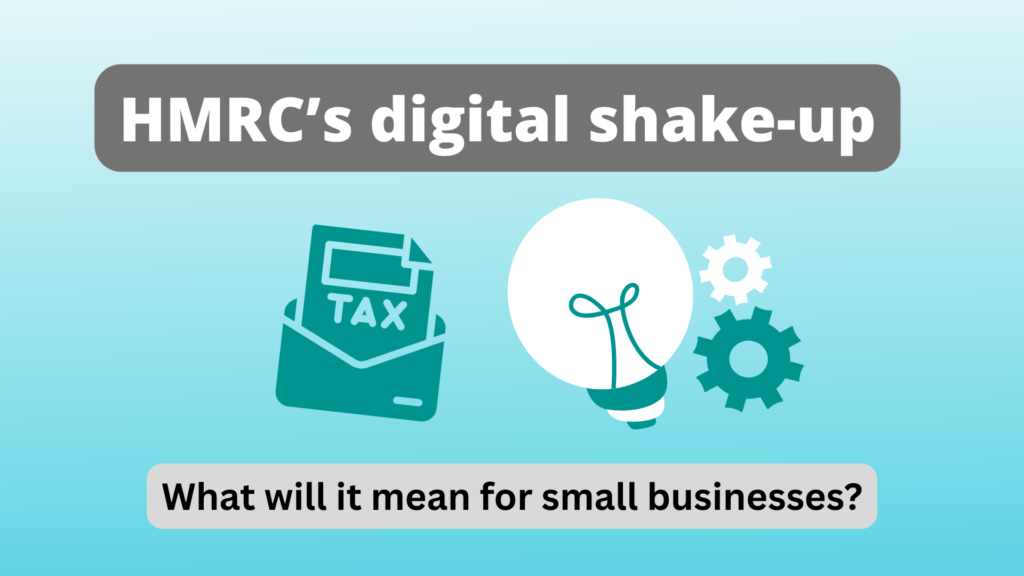If you run a small business, you could find tax admin taking up precious time. But the good news is that HMRC recognises the challenges – and has a transformation roadmap to make tax quicker and simpler over the coming years.

By 2030, HMRC wants at least 90% of customer interactions to be digital. That means more online tools, fewer paper forms, and hopefully less time lost to phone queues. Here’s what’s in the pipeline and how it could make your life easier.
1. No “Making Tax Digital” for corporation tax (for now)
HMRC has confirmed it won’t be rolling out Making Tax Digital (MTD) for corporation tax – at least, not in the near future. Instead, the focus will be on upgrading internal systems to make corporation tax compliance smoother.
MTD is already in place for VAT, and from April 2026, it’s coming to income tax for people earning over £50,000 (dropping to £20,000 by April 2028). HMRC is also exploring how to include those with even smaller incomes – but corporation tax will stay out of the MTD club for now.
2. E-invoicing and pre-filled tax forms
One of the biggest headaches with tax is human error – missing figures, miscalculations, or forgetting to file something. HMRC is aiming to cut this down by:
- Expanding e-invoicing
- Pre-populating tax returns with data they already hold
- Sending “nudge” reminders to help with Self-Assessment and corporation tax filing
- Automatically registering people for Self-Assessment where needed
The idea is to make returns faster and less error-prone – saving you time and reducing the risk of an unexpected HMRC letter.
3. Goodbye Government Gateway, hello One Login
If you’ve ever struggled to remember your Government Gateway details, this could be good news. Between 2026 and 2027, HMRC will phase in GOV.UK One Login a single, more secure way to sign in to all government services.
It will come with a new feature allowing you to store important details like your National Insurance number in a wallet on your smartphone.
4. More training and AI help
From 2025 to 2026, HMRC will launch new educational packages to help small businesses get to grips with tax responsibilities. They’re also investing in AI-powered digital assistants and a personalised support system, so you can (hopefully) get answers faster.
5. Side hustle reporting made simple
If you’ve got a small side hustle – such as selling goods online or occasional freelance work – there’s change coming. By 2029, the tax-free threshold for small self-employed earnings will rise from £1,000 to £3,000.
HMRC plans to introduce a new digital reporting service for people earning below that figure, making it easier to stay compliant without a mountain of admin.
6. Cracking down on fraudulent umbrella companies
New rules coming in April 2026 will target umbrella companies involved in tax avoidance or fraud. Draft legislation is now in circulation, so expect stricter checks and tighter compliance here.
7. Companies House verification
The government wants to improve the visibility of company ownership in the UK – and so business owners will need to verify their identity via Companies House in the coming months.
If you own a limited company or are a person of significant control then you’ll need to take steps to meet ID verification requirements from 18 November 2025, within a 12-month transition period.
This change comes as part of an update to the Economic Crime and Corporate Transparency Act 2023, which aims to stop people setting up companies for illegal activities and reduce fraud.
Other updates
The roadmap also includes:
- Higher interest rates for late payments (already in place from April 2025)
- A phased-in online service for PAYE taxpayers
- A state pension forecast tool
- SMS confirmations for certain HMRC services
- Digital inheritance tax filing from 2027
- Direct-to-bank tax refunds
Plus, HMRC is leaning heavily into AI. If you already use accounting software that automatically tracks sales, applies the right VAT rates, and preps reports for you, you’re ahead of the game.
The bottom line
These changes won’t happen overnight, but the potential benefit is clear: less time on tax admin means more time to focus on growing your business.
While it’s great to see HMRC embracing technology, tax rules are still complex. If you’re unsure how these changes affect you, speak to an accountant. The right advice now can save you a headache (and potentially some money) later.
Need some help and support for your small business? Talk to your local accountants in the Lune Valley region. Contact us today.

